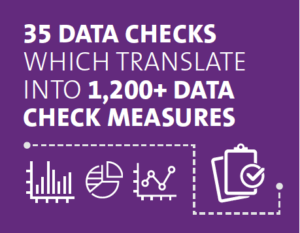Data are easily accessible, but not all data are well-suited to answer a given clinical research question. A team that includes DCRI faculty is working to build frameworks to assess whether data can be used in research studies.

It is important to assess data, the DCRI’s Keith Marsolo, PhD, (pictured left) explained, because data come from many different sources. For example, within PCORnet®, a national patient-centered distributed research network for which the DCRI serves as a coordinating center, real-world data come from health systems and health plans across the country. Variation in source systems and data collection practices can lead to data heterogeneity that is problematic for research.
Alongside its work in defining PCORnet’s common data model, a team led by Marsolo has developed routines to assess data quality—what Marsolo called “a foundational set of data checks.” This material has been made publicly accessible on the PCORnet website, which is novel, Marsolo said, because many other groups working with real-world evidence (RWE) do not publicize their data quality processes.

The data checks help determine whether available data is fit for purpose, or able to be used to answer the research question at hand. Although each study team will need to address study-specific questions, the checks developed by Marsolo’s team answer baseline questions of dataset fitness and shorten study start-up time.
Marsolo also leverages his expertise outside of PCORnet by collaborating with other organizations at Duke. He serves as a member of the data quality working group convened by the Duke-Margolis Center for Health Policy’s RWE Collaborative. By participating in this group, which includes researchers, industry representatives, patients, and other stakeholders, he helps translate complex data concepts so they can be viewed through a health policy lens. The group hopes to inform the Food and Drug Administration’s (FDA) work in the RWE space.
This article originally appeared in the DCRI’s 2018-2019 Annual Report. View more articles from this publication.